Stillbirth: Mother calls for inquest into son's death
- Published
The mum of a stillborn boy says she wants "the truth" about why her baby died
"You hear his heartbeat and the next thing you know, you've got nothing."
A woman whose son was stillborn has said she wants to change the law to enable an inquest to investigate the circumstances surrounding his death.
Katie Wood's son Oscar was stillborn on 29 March 2015, but under law in England and Wales, inquests for stillborn babies cannot take place.
A consultation was put out by the UK government in March 2019, but the findings have yet to be published.
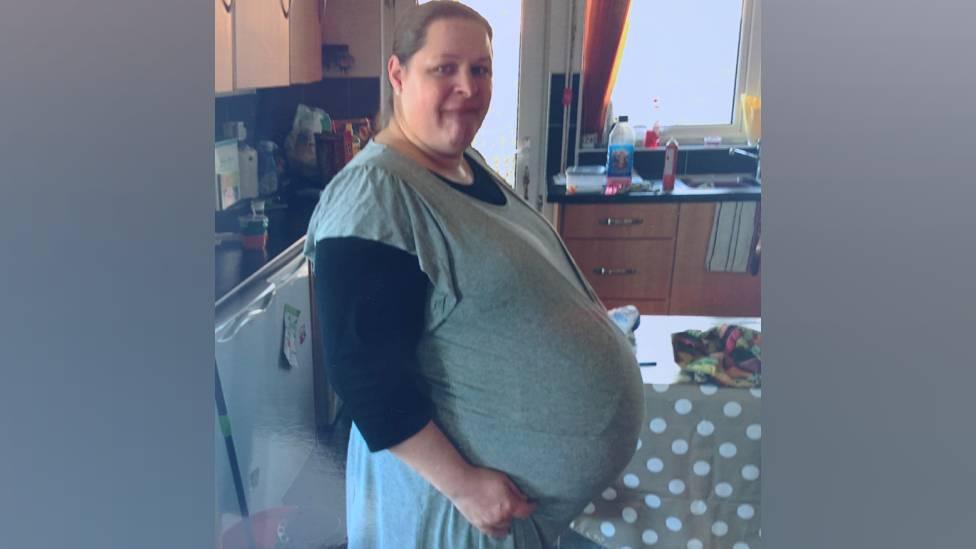
Katie's pregnancy was challenging but did not give any serious cause for concern
The UK government said it would set out its response in due course, but this delay was criticised by the House of Commons justice committee in September.
Katie and her family said they have never received satisfactory answers about why Oscar died.
Her pregnancy, while challenging, had not given any serious cause for concern.
"I'd had a miscarriage before I found out that I was pregnant with Oscar, so it was nice. We were really excited to be adding to our family", she said.
"It was quite a difficult pregnancy. It felt very long. A lot of people used to ask me if I was having twins because I was so big."
Four weeks before he was due, a scan showed Oscar had grown considerably in a short space of time, but no significant concerns were raised for his health.
On the day of her labour, Katie and her husband Samuel went to the Royal Gwent in Newport from their home in Chepstow, Monmouthshire.
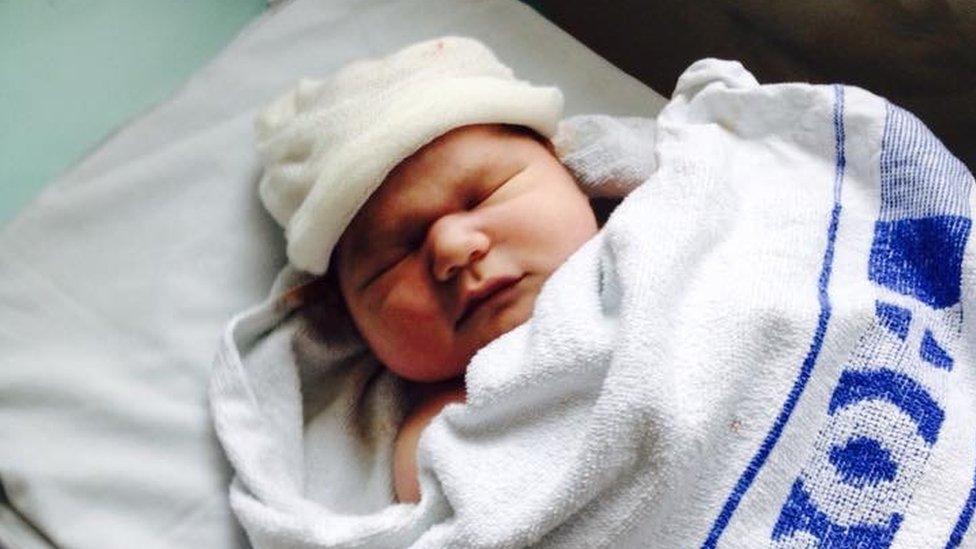
Oscar was stillborn on 29 March 2015
In the hours leading up to Oscar's birth, there was still little indication of what was to come.
Arriving at about 06:30 in the morning, Katie said: "Everything seemed fine.
"I got sent to triage where they basically led me onto the bed, put a CTG monitor on me, made me go to the toilet. All the usual things.
"I could hear my son's heartbeat from the monitor."
She was moved to the labour ward at about 09:00, when a scan showed Oscar was in the pelvic area.
That was when things started to go wrong.
"I was trying really hard to push, and I remember saying to them he was stuck", she said.
"This went on for a little while and eventually they just had to pull Oscar out.
"They took him to the resuscitation table. They tried for about 18 minutes to bring my son back but at that point it was too late. He was gone.
"You've gone in with a car seat in the back of your car expecting to come home with a baby.
"You hear his heartbeat and then the next thing you know, you've got nothing.
"You've got a dead baby in your arms."
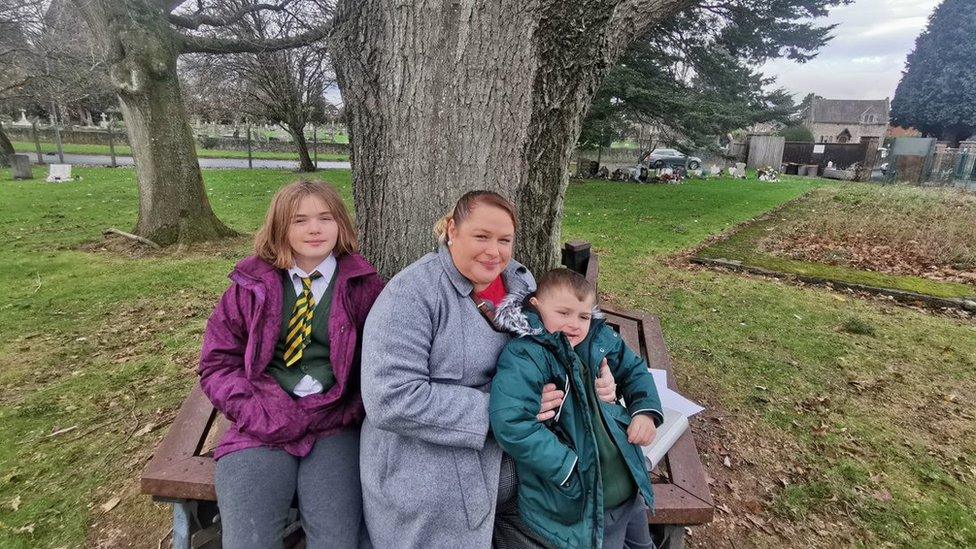
Katie Wood wants a change in the law so she can have in inquest into the stillbirth of her son
An investigation by the Aneurin Bevan health board found a number of failings in Katie's care.
A post-mortem examination suggested a condition known as shoulder dystocia, where the baby's shoulder becomes stuck during birth, may have contributed, but this is rarely fatal.
The health board said it conducted a serious incident investigation into Oscar's death and added: "Whilst we seek to find answers during any investigation, in some cases, a full understanding around the cause of death may not always be achieved and we accept the unavoidable distress this may pose for families."
Clinical negligence and medical law specialist, Mari Rosser, says allowing coroners to look into the reasons for a baby's death is long overdue.
"Currently parents who suffer a still birth can have the circumstances investigated, but the circumstances are investigated by the health board and of course that's less independent," she said.
"It's broadly agreed that it would be a good thing to extend the jurisdiction of the coroner to include stillbirth cases.
"It brings an independent focus to the investigation.
"Because the family would be interested parties, they become far more involved in the inquiry process than they would be potentially in the one that is instigated and carried out by the health board."
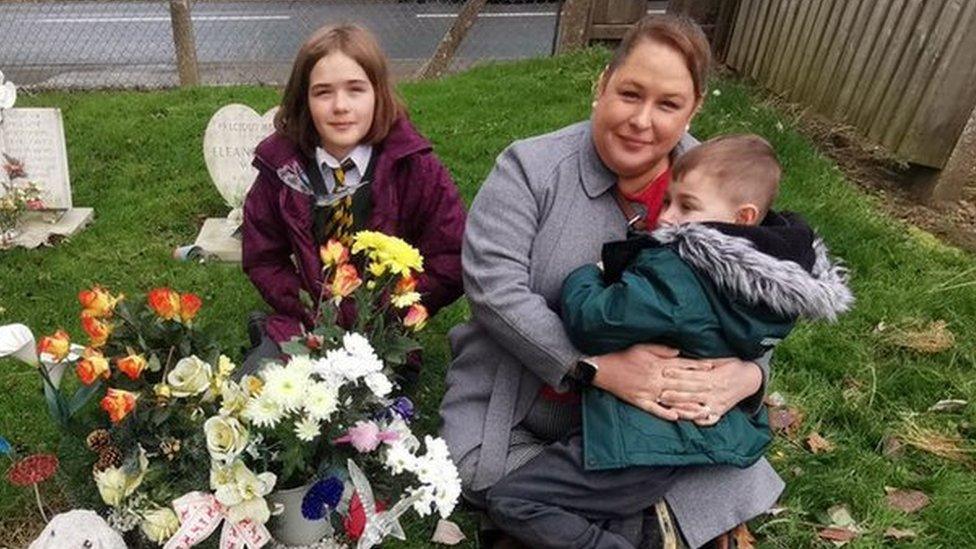
Katie, pictured at Oscar's grave, still hopes for an inquest one day
The Stillbirth and Neonatal Death Charity (Sands) also welcomed calls for reform, describing the current system of investigation when a baby dies as "wholly inadequate".
The charity said inquests into stillbirths should be held only at the request of the baby's parents, but Ms Rosser says allowing a coroner to investigate all stillbirths could help to avoid such tragedies in the future.
As of 2020, the proportion of stillbirths in Wales stood at 3.6 per 1,000 births.
This figure is lower than recent years, but remains the highest rate of all UK nations.
"It's a chance to learn lessons", said Ms Rosser.
"The coroner has an opportunity following the investigative process of the inquest to issue a prevention of future deaths report.
"That, I'm sure, is a feature that will be hugely reassuring for any parents who find themselves in this awful, tragic situation."
'If he had taken a breath, this would be different'
Katie is still hopeful a coroner may one day be able to investigate the circumstances surrounding Oscar's death and is petitioning the UK government to change the law.
"As a mother you have all these questions," she said.
"For closure, for me and my family, I just want the truth. An inquest is where they search for the truth and that's all I want.
"I can't have that because he was stillborn. If he had taken a breath, this would be a very different situation.
"It's about getting the answers as to why my son died and what I can do to help other people from having to go through the same thing as we had to."
The Welsh government said: "In Wales we review the circumstances and care leading up to and surrounding each stillbirth, parents' input into this is vital.
"We are also working with the Ministry of Justice on the consultation on changing the law on inquests for stillbirths."
- Published5 October 2021
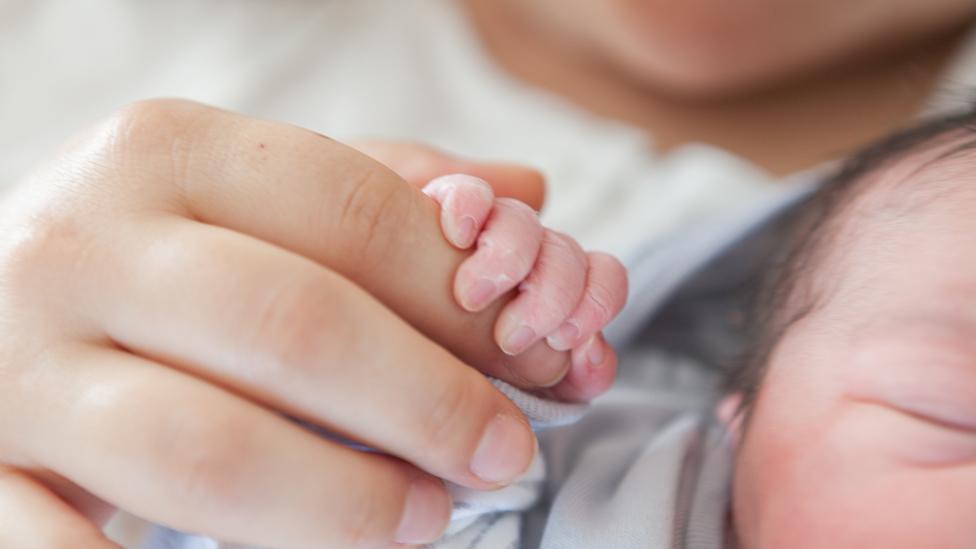
- Published21 November 2021
